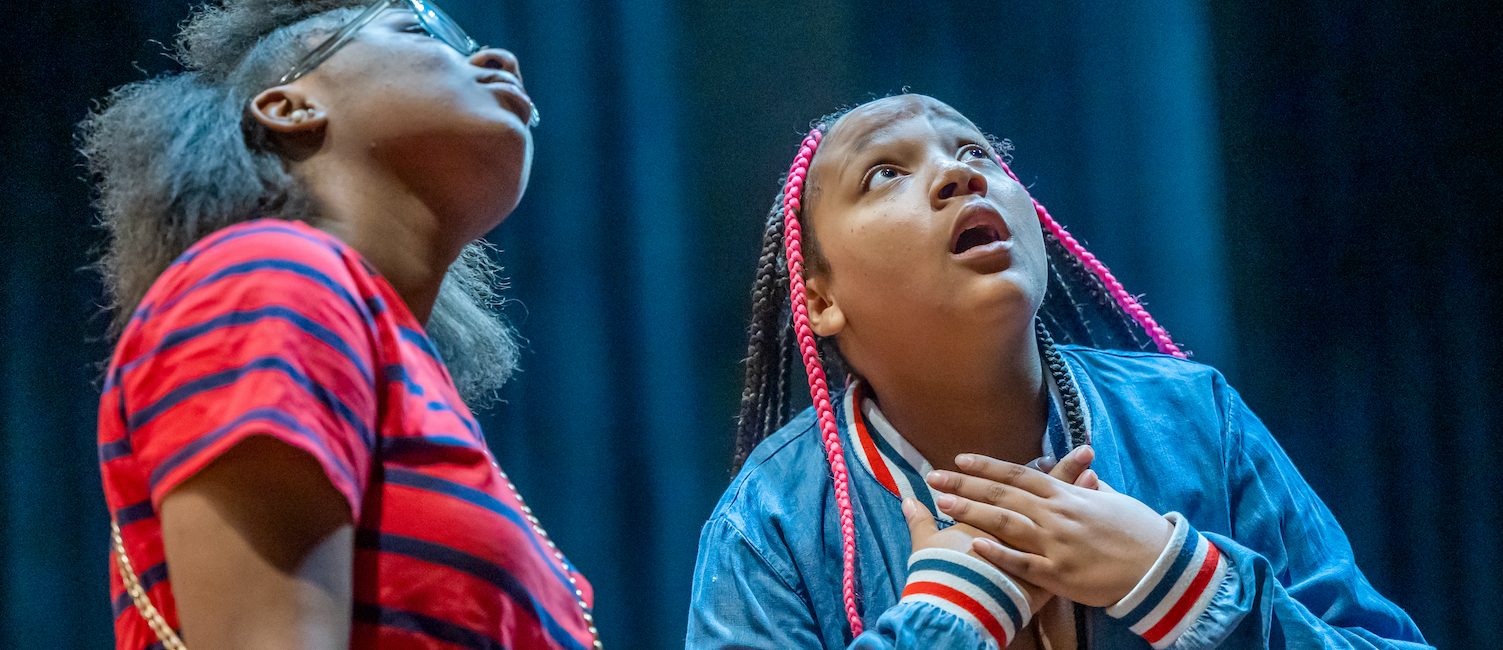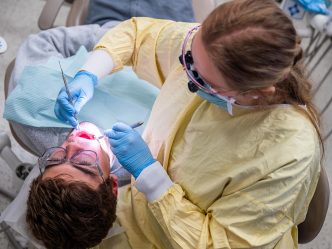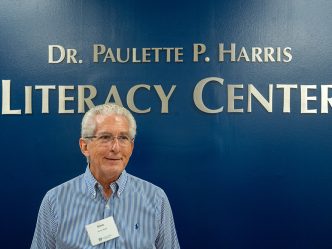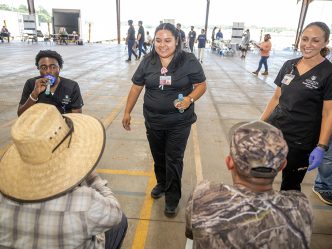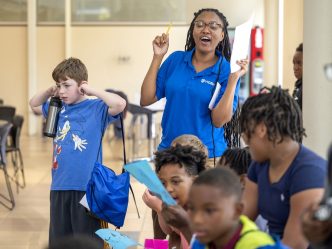As the division chief of General Pediatrics and Adolescent Medicine at the Children’s Hospital of Georgia, April Hartman, MD, knows all too well the challenges medical students face when they are first learning how to treat pediatric patients.
“You never know what you are going to get when you walk into a room with a pediatric patient and their family,” Hartman said. “There are lots of challenges, so having a good bedside manner and being able to establish a good rapport is crucial to developing trust with the patients that you see.”
To better prepare medical students at the Medical College of Georgia to work with adolescent patients, Hartman developed the Pediatric Pathways Program that combines Augusta University students and local middle and high school students in a unique collaboration to help address pediatric health concerns.
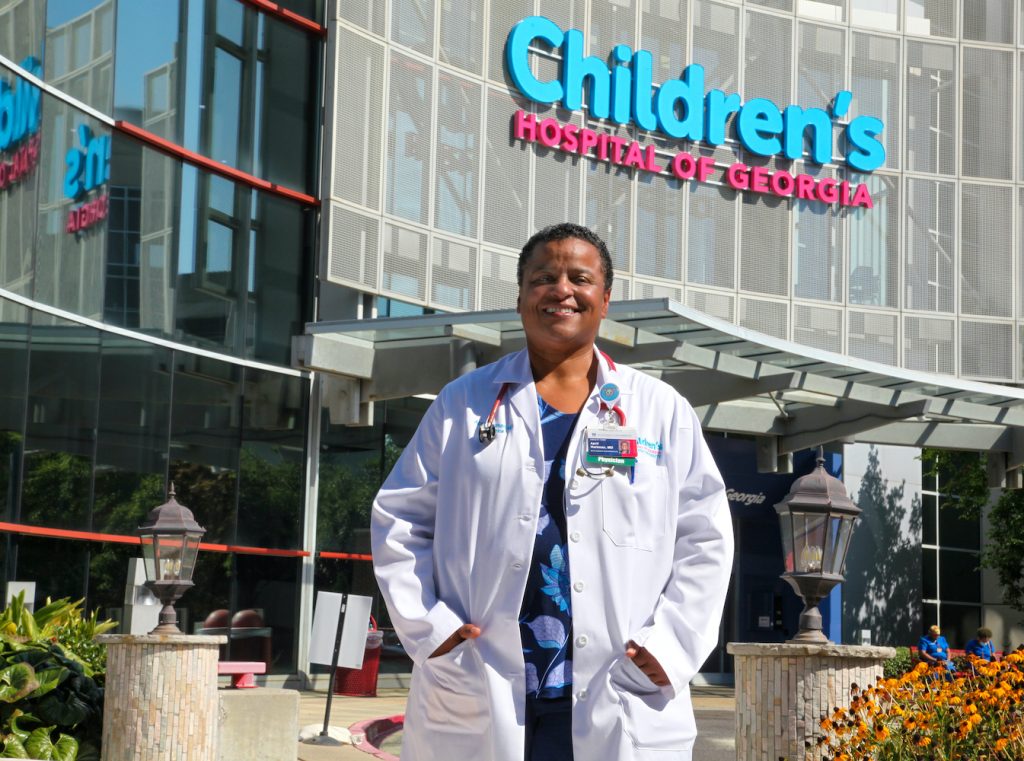

“Having a good bedside manner and being able to establish a good rapport is crucial to developing trust with the patients that you see.”
April Hartman, MD, the division chief of General Pediatrics and Adolescent Medicine at the Children’s Hospital of Georgia
For two weeks this summer, Hartman, along with Melanie Kitchens O’Meara, PhD, an associate professor of performance studies in the Department of Art and Design at Pamplin College of Arts, Humanities, and Social Sciences, worked with local middle and high school students to teach them dramatic acting skills to become pediatric standardized patients for mock appointments with medical students.
“The Department of Pediatrics already had a partnership with Hornsby Middle School, and one of the requests we received was for more mentoring. And we were trying to think, ‘How can we do a mentoring program in a way that will have an impact and can get some young people interested in college and, maybe, the health care field?’” Hartman said, adding it was important to encourage bi-directional learning that promoted a mutual benefit for the Hornsby Middle School students and the medical students. “For our medical students, they need to have clinical experience earlier and earlier. It used to be they needed clinical experience in their third and fourth year. Now, they wanted to have it in the first year, and, because I deal with a lot of behavioral health, one thing I noticed is the medical students are sometimes very awkward asking behavioral health questions.”
Hartman said medical students often have the opportunity to work with adult standardized patients, but interaction with pediatric standardized patients isn’t as common.
“I noticed that when asking pediatric patients about issues such as depression or suicide, the medical students were really having a hard time with it,” Hartman said. “I realized they just need to practice with pediatric standardized patients so they get more comfortable with those issues. Because it isn’t helpful for the medical students to practice on adults. Teenagers don’t talk like adults. The medical students needed to learn how to talk to real kids.”
Learning the art of acting
Hartman teamed up Melissa Powell-Williams, PhD, the director of the Qualitative Research Lab Center, and Dustin Avent-Holt, PhD, the director of the Center for Social Science Research at Augusta University, to develop this two-week summer program to teach dramatic skills to some students at Hornsby Middle School who could help prepare medical students for real-world patient situations.
“I did some research, and I saw that there was a theater model where students are taught acting,” Hartman said. “It is a role that they are playing as a standardized patient. They are not using their own stories. But we are really teaching them acting skills so that they can create this role that they are going to play. For example, maybe they are going to be a rebellious teenager or maybe they are going to be the perfect teenager who just started vaping or maybe they are being bullied. They come up with different scenarios for the medical students, and it’s up to the medical students to talk to them and assess the situation.”
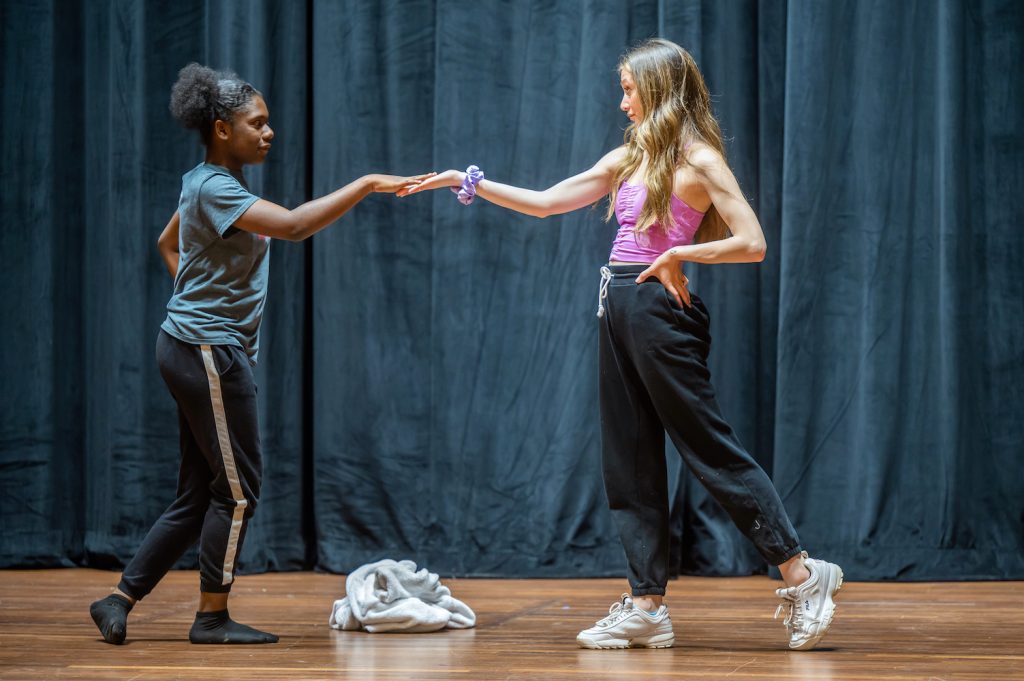

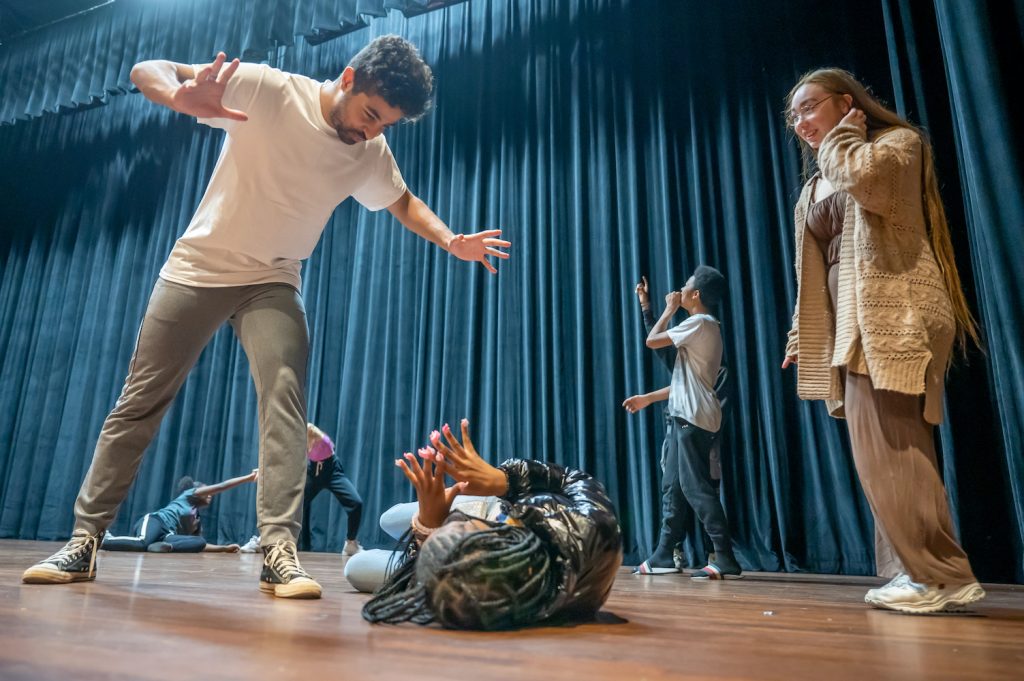

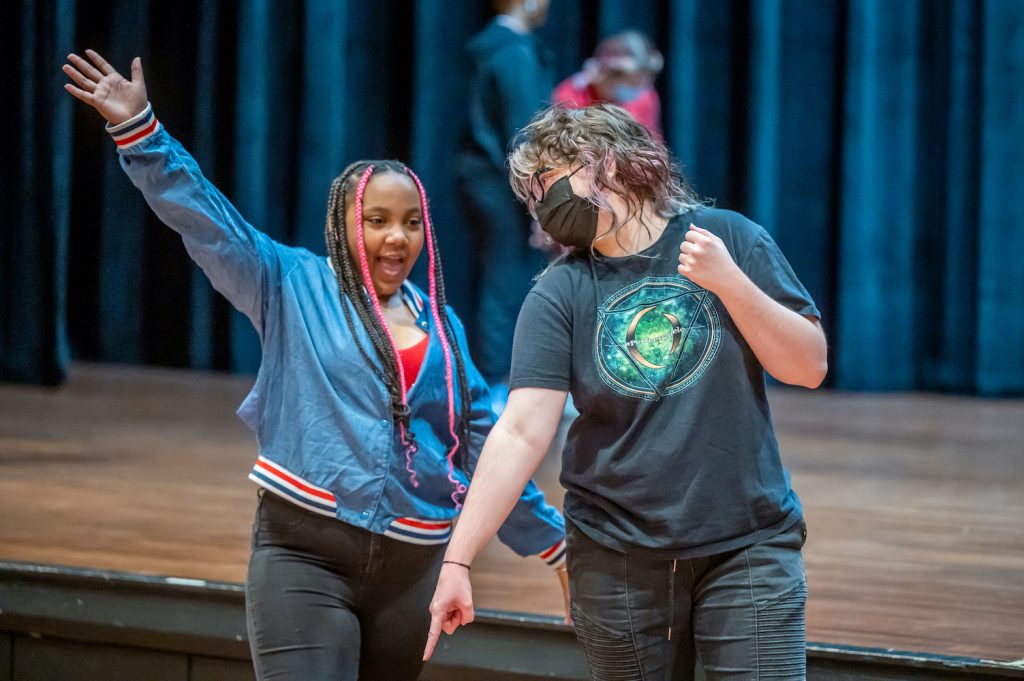

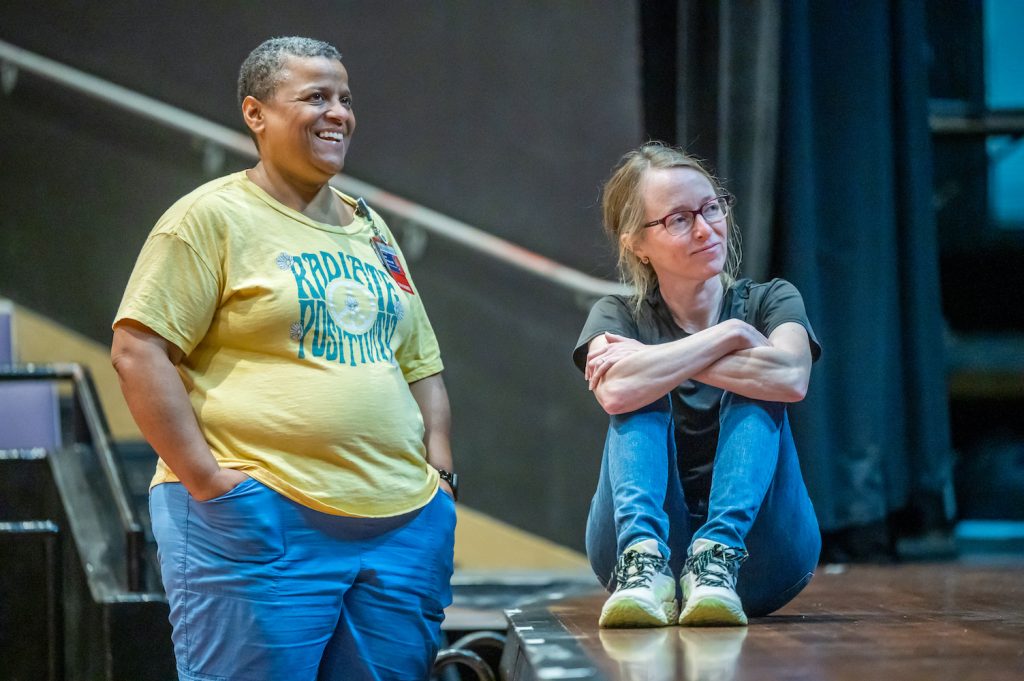

Augusta University students involved in Theater AUG signed up for the summer course for college credit to help teach the middle and high school students skills in acting, O’Meara said.
“The Augusta University students and middle school students are partnered as a parent and child. They create like a family unit,” O’Meara said. “We wanted to create a family dynamic so the medical students could practice how they talk to and ask questions to patients who are this age. For the past two weeks, we have played a lot of theater games and activities that help the students get to know each other and break the ice so that they are comfortable performing in front of the medical students.”
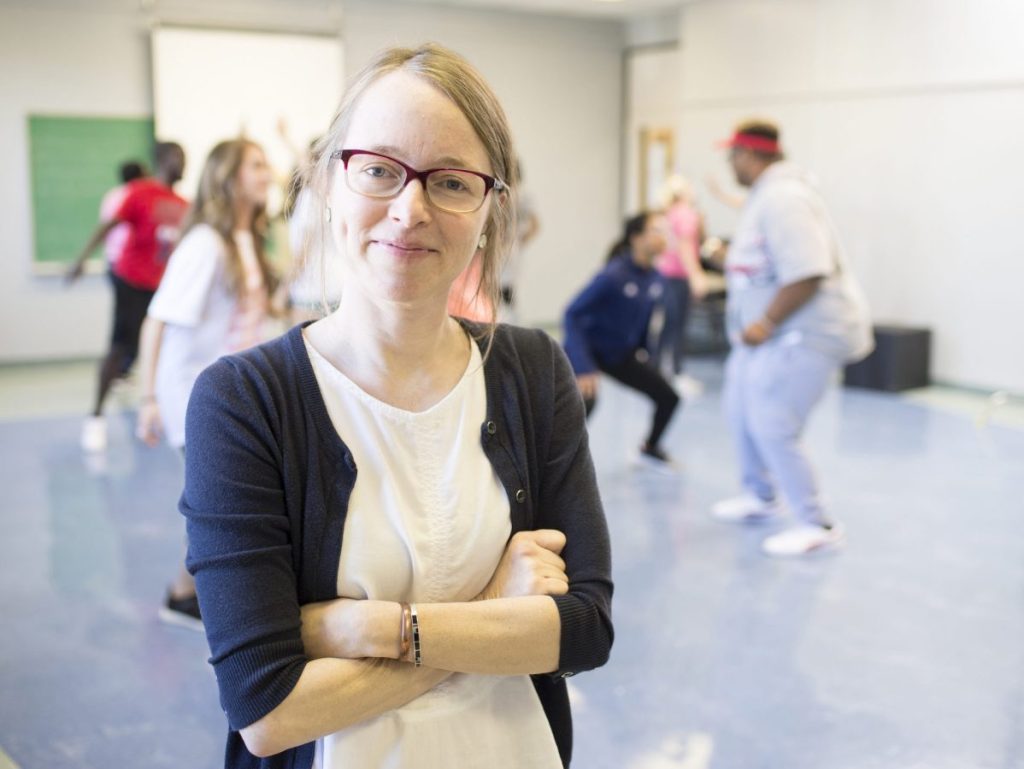

“We wanted to create a family dynamic so the medical students could practice how they talk to and ask questions to patients who are this age.”
Melanie Kitchens O’Meara, PhD, an associate professor of performance studies in the Department of Art and Design
For the middle and high school students who signed up for the two-week camp, once their training is complete, they receive a certificate that certifies them as standardized patients, Hartman said.
“They are learning about what types of questions doctors have to ask and why,” Hartman said. “During the simulation, the complaint for each of the families is that the child is having problems in school, and that’s why they are going to the doctor. So, they are all starting at the same place and then they have to create a story around that.”
Creating a family dynamic
Niajah Tann, a former student at Hornsby Middle School who will be starting the ninth grade next year, said she did not know what to expect when she signed up for the Pediatric Pathways Program.
“I thought it was going to be boring at first,” she said, laughing. “But when I got here, it was actually a lot of fun. I’m learning how to act, and I’m actually good at it. And I’ve met so many nice friends and cool people. It made me feel like I’m a college student. I love it here. This is my college now.”
Avery Lewis, a senior majoring in the Bachelor of Fine Arts in Digital and Visual Storytelling program at Augusta University, said when she first heard about the Pediatric Pathways Program, she wasn’t sure if it was a good fit for her because she doesn’t consider herself a “science person.”
“But I was pleasantly surprised with the combination of the theater aspects and the medical aspects of this program and how they can be interwoven,” Lewis said. “Because I came at this from a perspective of, ‘I’ve never been good at science. I’ve never had an interest in that sort of thing, and I don’t really know what I’ll be doing or how I can be of use in this.’ But it’s been really cool to see how they’re more related than I initially thought.”
Over the two-week program, Lewis was playing Tann’s mother in several mock simulations of their visit to the doctor’s office.
“We’ve been running through the simulations, and we kind of preplan certain things. I have a very creative child,” Lewis said, laughing with Tann. “I know she is going to pull some things that we didn’t exactly plan on, but I have to react accordingly. Because not every teenager is going to be open and honest with every detail about their lives with their parents. So, it’s been really fun to see what she is going to bring to the table and for me to decide what kind of parent I am going to be. Am I going be overprotective? Am I going to be lackadaisical about things? So that’s been really fun to play around with the different scenarios.”
Gileah Harper, who will be starting the eighth grade at Hornsby Middle School, said she enjoyed developing her family dynamic with the drama students from Augusta University.
“I definitely like my parents. We’ve gotten to get to know one another the past few weeks, and we’ve learned how to act like a real family,” Harper said. “I’m excited to meet with the medical students. I’ve come up with some scenarios for them. I just hope nobody steals my ideas on the patient I’m playing. But I’ve been changing it up several times because I don’t want everyone to have the same issues for the med students. It’s important that we give them a variety of stuff to deal with like real kids.”
Destiny Barrett, a sophomore majoring in cybersecurity and minoring in communication, said it is crucial for medical students to learn how to interact with young children and teenagers.
“I know for me, I was terrified of going to the doctor when I was younger,” Barrett said. “If medical students learn how to talk to kids and better understand kids in general, they can properly address some of the medical issues they are facing.”
Working with pediatric patients
When the acting students involved in the Pediatric Pathways Program met with the medical students on their final day of the camp, the future doctors were faced with a variety of scenarios including the teens suffering from depression, eating disorders, anxiety and drug use.
Ankita Shah, a second-year medical student at the Medical College of Georgia, was faced with a scenario of a teen who admitted she was having suicidal thoughts.
“It was challenging because she began by talking about her grades slipping, which is important. And then she was talking about her concerns about transitioning to high school and having trouble sleeping, but then she admitted that she was being bullied and had suicidal ideation,” Shah said. “I wanted to talk about all those things because they are all important, and the advice and evaluation you give can change their lives forever. And, in my scenario, the mom didn’t know about any of these issues. It was the first time she was hearing about any of it. So it was hard because you had to navigate her feelings and the child’s feelings together, which isn’t easy in the first appointment.”
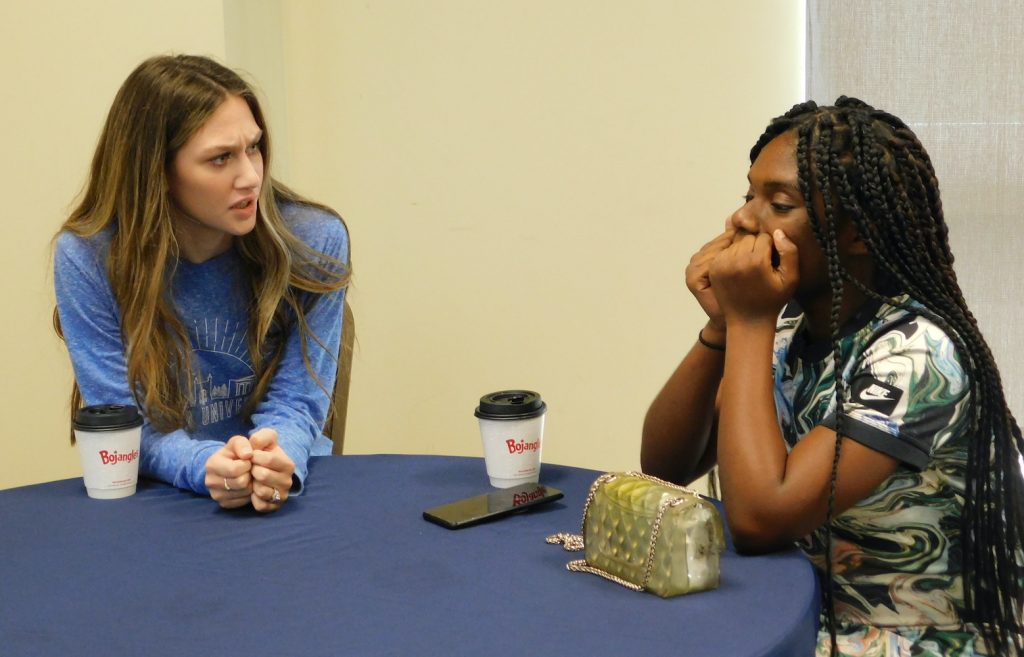

Lewis, who played the mother in this particular scenario, said Shah was successful in talking to both the child and the parent in a respectful manner, which helped ease the tension in the room.
“We had emotional whiplash because I was learning about all of these problems my child was having all at once,” Lewis said. “But the doctor was very impressive. It was obvious that her main concern was for the child, and she didn’t get caught up in the dramatics. She asked if I, as the mom, could leave the room, so they could talk privately. And by the time I came back, my daughter was ready to talk and share. It was an effective approach.”
Whenever a physician walks into a room with a patient and their family, it is important that the doctor is prepared to handle any scenario in a professional and productive manner, Hartman said.
“For the medical students and for the families, subjects like depression and drug use are uncomfortable topics that people tend to shy away from. But for the medical students, we try to teach them to ask those important questions,” Hartman said. “Because if you don’t ask, you won’t know. And a lot of times, that is not stuff that they are going to just voluntarily say.”
Madison Ives, a second-year student at the Medical College of Georgia, said in her scenario the mother and daughter were arguing with each other, and she had to calm the dispute in order to bring the focus back on the child.
“It was very realistic because I have seen actual patients where they get argumentative with one another. They forget you are there, and it can be very awkward,” Ives said. “But I just tried to focus on the daughter’s behavior and why there were behavioral concerns. Because, I know for me personally, while it’s been a little while since I’ve been 14, I do remember any time that I acted out, it wasn’t just I’m acting out because I wanted to act out. There was something going on. I was angry or upset about something. And acting out is just a way to express that something bigger is going on with that child.”
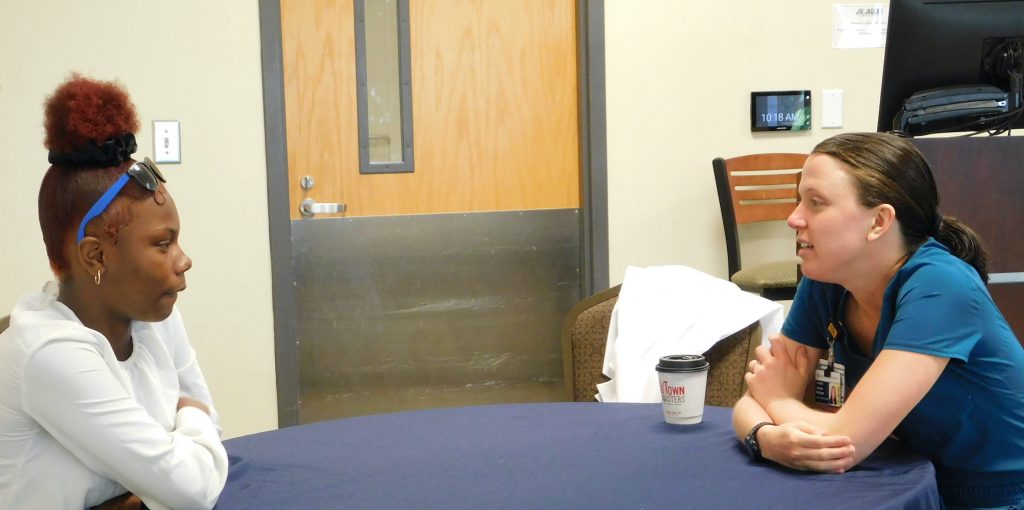

Navigating a family dynamic can be challenging during an appointment with a child, Hartman said. That is why she created the Pediatric Pathways Program at Augusta University and hopes to continue it for years to come, she said.
“It is important to be prepared for anything when you walk into the room,” Hartman said. “Sometimes there is mom, there’s dad, there’s grandma, there’s a brother and they all have an opinion about what’s happening with that child. Sometimes it will feel awkward and uncomfortable. You just have to be OK with that. And this comes with time and practice, which is why we are doing this. It’s a process so that you can practice building a relationship with your patient.”
 Augusta University
Augusta University
